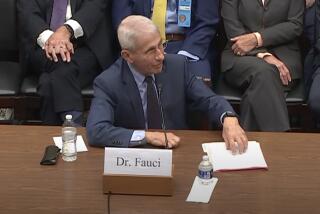With Ebola, CDC’s Tom Frieden is facing the challenge of his career
When Dr. Tom Frieden was appointed to head the U.S. Centers for Disease Control and Prevention in 2009, President Obama praised him as an expert in preparedness and response to health emergencies.
“His experiences confronting public health challenges in our country and abroad will be essential in this new role,” Obama said in a statement at the time.
Frieden, 53, is facing the challenge of his career now that Ebola has made its way to the United States, claiming the life of a Liberian man in Dallas and sickening two nurses who treated him.
But the native New Yorker, who graduated from Columbia University College of Physicians and Surgeons, is by now accustomed to dealing with high-profile and weighty problems.
During a stint at the CDC in the 1990s before he became director, Frieden worked to investigate a wide range of issues, including the spread of multi-drug-resistant tuberculosis in New York in 1991.
“He played a crucial role in tracking down how this thing was spreading and what needed to be done to stop it,” said Laurie Garrett, a senior fellow for global health at the Council on Foreign Relations, who at the time was a reporter covering the outbreak. “He bridged the response effort between New York and CDC officials and worked to get it solved.”
Frieden then served for seven years as commissioner of the New York City Health Department, one of the country’s largest health agencies.
In that time, the department helped ban public smoking in bars and restaurants, and Frieden oversaw the response to anthrax threats that plagued the city after the Sept. 11, 2001, terror attacks. Frieden, under the guidance of then-Mayor Michael Bloomberg, also worked to transfer the city’s health records to electronic databases. The effort created the nation’s largest community-based electronic health record network and was touted as putting the city’s healthcare system on a better track to dealing with preventive care.
Frieden also worked alongside Bloomberg to promote a soda tax, arguing that it would help to lower obesity rates -- an proposal that drew a strong rebuke from groups such as the American Beverage Assn.
Meanwhile, after he traveled to West Africa in August, Frieden began to sound the alarm about Ebola, saying that the situation there was “even worse” than the CDC had feared.
But as the CDC worked successfully to treat Americans transported back to the United States after contracting the virus while working in West Africa, questions in the government agency began to linger once the virus arrived in Dallas in late September.
Frieden has faced a barrage of questions about how the CDC handled the case of Thomas Eric Duncan, the Liberian man who traveled to Dallas and then died of Ebola, and why the agency allowed a nurse who had a mild fever after treating Duncan to fly on a commercial airline.
“I have no doubt that we’ll stop this in its tracks in the U.S.,” Frieden said at a news conference Sept. 30, when Duncan was the only Ebola patient to have been diagnosed in the country. “The bottom line here is that I have no doubt that we will control this importation, or this case, of Ebola so that it does not spread widely in this country.”
On Wednesday, White House spokesman Josh Earnest said Obama has confidence in Frieden. Still, he’s been the subject of criticism as Republican Reps. Pete Sessions of Texas and Tom Marino of Pennsylvania have called for him to resign.
Speaking before lawmakers on Capitol Hill on Thursday, Frieden voiced an openness to ideas on how to combat the virus at a time when some polls suggest public concerns about Ebola could spread.
“We’re always open to new ideas,” he said in his opening remarks before a panel of lawmakers.... “because our bottom line is using the most accurate data to inform our actions and protect health.”
Follow @kurtisalee and email kurtis.lee@latimes.com
More to Read
Sign up for Essential California
The most important California stories and recommendations in your inbox every morning.
You may occasionally receive promotional content from the Los Angeles Times.











